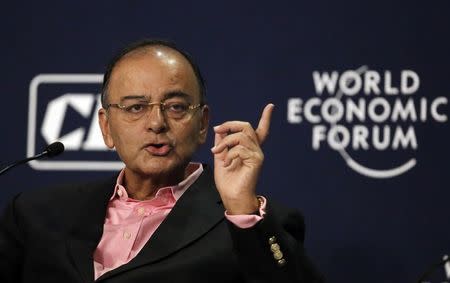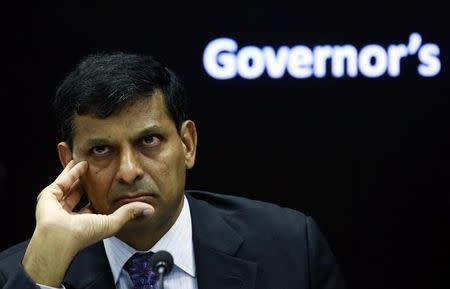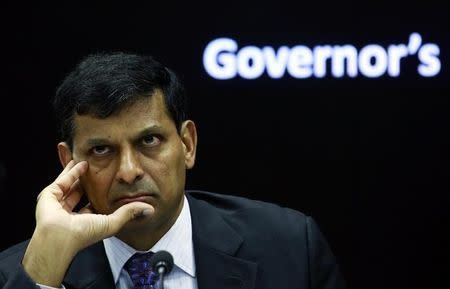Exclusive - India central bank under pressure to cut rates as growth slips
By Manoj Kumar
NEW DELHI (Reuters) - India's economic growth probably slowed to around 5 percent in the three months to September, slipping from 5.7 percent in the previous quarter, two senior finance ministry sources said, putting pressure on the central bank to cut interest rates.
The sources said Finance Minister Arun Jaitley would press Reserve Bank of India (RBI) Governor Raghuram Rajan to lower borrowing costs when the two meet ahead of a decision on interest rates next Tuesday.
Six months after Prime Minister Narendra Modi swept to power with a promise that "better days are coming", growth of 5 percent would mark a serious setback from the previous quarter and fall far short of the 8 percent that Asia's third-largest economy needs to create enough jobs for its growing workforce.
Official GDP figures are due for release on Friday.
Indian finance ministers often "jawbone" the RBI on interest rates, but Jaitley's calls have become unusually insistent of late. Aides say he will make the case for cuts forcefully.
"When Rajan meets the finance minister ahead of the policy review, he would be urged to cut the interest rates," one senior finance ministry official with direct knowledge of the matter told Reuters. "A rate cut is the only hope for industry facing poor domestic and external demand."
HISTORY OF INFLATION
Rajan, who made no reference to policy rates at a speaking engagement on Tuesday in Gujarat, has resisted calls to cut the RBI's 8 percent repo rate , even though consumer inflation has dipped below the 6 percent target he wants to hit by January 2016.
The closest Rajan got to addressing the issue was in an answer to a question on the steep cost of borrowing to households, which he said was the result of India’s history of high inflation.
The hawkish former IMF chief economist has made it his mission to introduce inflation targeting to India, a country long plagued by double-digit price rises that hurt the more than 700 million people who live on $2 a day or less.
While factors such as weak international oil prices and flagging export demand have prompted Asia's top two economies, China and Japan, to take aggressive action to ease monetary policy, Rajan has held out.
Bonds have rallied on hopes that falling inflation would lead the RBI to cut rates earlier than expected, but they took a breather on Tuesday. The benchmark 10-year Indian government bond closed flat to yield 8.16 percent, down 30 basis points since the RBI policy meeting in October.
"There is no doubt that we are on the threshold of a change in interest rates," said Nirav Dalal, group president and senior managing director of financial markets at Yes Bank. "It is a matter of time now."
INFLATION TARGET
Policy makers in New Delhi say the RBI should follow its Asian counterparts, ratcheting up the pressure on a central bank that enjoys policy autonomy but lacks the kind of independence enjoyed by central banks in the West.
"Rajan would have to really work hard to convince the Finance Minister why he will not cut interest rates this time," said another finance ministry official who is responsible for tax policy.
After two years of sub-5 percent growth, India's $2 trillion economy is struggling to break consistently above that level, which means the tax take for the year to end-March is now set to miss budget by as much as 900 billion rupees (9.57 billion pounds), the second official estimated.
Jaitley has so far vowed to uphold a fiscal deficit target of 4.1 percent of GDP, but his aides caution that any further cuts in spending that the government has to make to hit it could further sap growth.
"Expenditure cuts are certain, and that means a further slowdown in the economy," the official said.
PUSHING ON STRING
Independent economists caution, however, that cuts in interest rates may not be the best medicine for India, which is in desperate need of structural reforms to make it easier to do business.
"Easing monetary policy without enacting far-reaching structural reforms that raise productivity would only risk re-igniting price pressures when things turn up, leaving everyone worse off," Frederic Neumann at HSBC wrote in a commentary.
Red tape has strangled investment, and with it demand for credit. At the same time a state-dominated banking system riddled with bad loans may put an investment recovery at risk, the OECD said last week.
"A rate cut will have a sentiment boost impact for consumers but then that sentiment boost won't last long as the supply side is constrained," said Indranil Pan, chief economist at Kotak Mahindra Bank.
"The fall in inflation is not a structural correction but a cyclical correction because oil, commodity prices are not in our hands and they can turn anytime."
(Additional reporting by Suvashree Chaudhury in Mumbai and Neha Dasgupta in Anand; Writing by Douglas Busvine; Editing by Will Waterman and Alex Richardson)





